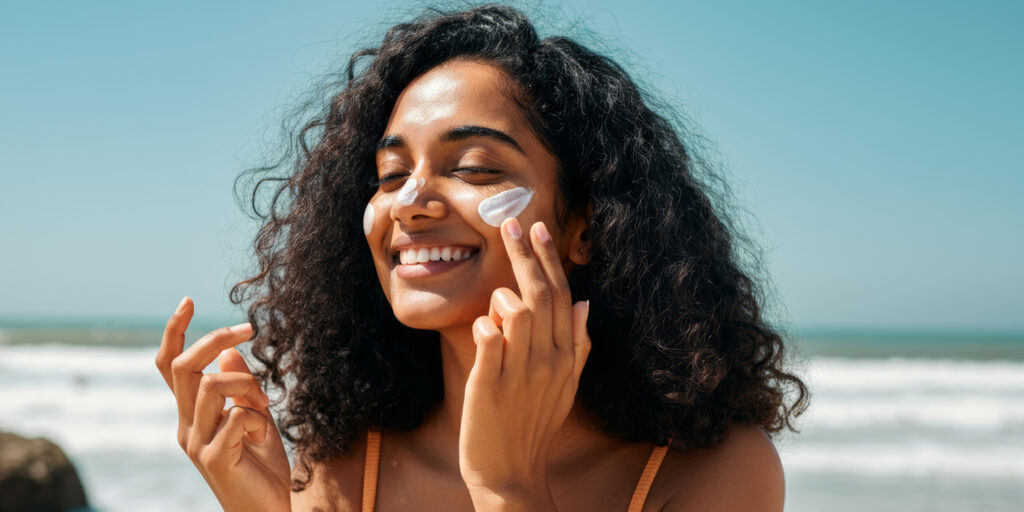Summer Skincare Routine: Quick and Effective Care for Every Skin Type

As temperatures rise and humidity increases, the effects often show up on the skin. From excess oil and unexpected breakouts to dryness caused by prolonged sun exposure, summer can be especially harsh for the skin. A well-planned summer skincare routine not only protects the skin from heat and pollution but also helps maintain its natural glow. Since every skin type reacts differently to seasonal changes, this guide breaks down simple yet effective skincare in summer, offering targeted advice for oily, dry, and combination skin. From daily steps to product choices and hydration tips, this guide covers everything needed for a healthier and more balanced complexion all summer long. Let’s begin.
Table of Contents
ToggleWhy Skincare in Summers Needs a Different Approach
Skincare isn’t one-size-fits-all, especially when the seasons change. Summer brings longer days, stronger sun exposure, high humidity, and increased sweating, all of which directly impact the skin’s texture, oil balance, and overall health.
In warmer months, the skin tends to:
- Produce more oil, particularly in the T-zone, increasing the risk of clogged pores and acne
- Lose moisture quickly, especially in dry or air-conditioned environments, making some areas feel tight or flaky
- Suffer from UV damage, which can accelerate ageing, trigger pigmentation, and dull the skin’s natural tone
- Experience irritation or rashes, especially in those with sensitive or allergy-prone skin
These shifts mean that a heavy winter routine may not work during summer. Instead, skincare in summers should focus on lightweight hydration, sun protection, and ingredients that balance oil and soothe heat-related inflammation. Adjusting the routine ensures the skin stays comfortable, protected, and radiant throughout the season.
Daily Summer Skincare Routine (Universal Steps)
A consistent summer skincare routine doesn’t have to be complicated—it just needs to be suited to the weather and gentle on the skin. Follow these simple steps to keep your skin fresh, hydrated, and protected during summer, no matter your skin type:
Step 1: Cleanse Twice a Day
Use a mild, pH-balanced cleanser to remove sweat, sunscreen, and excess oil. Gel-based cleansers are ideal for summer, especially for acne-prone or oily skin.
Step 2: Apply an Antioxidant Serum
After cleansing, apply a Vitamin C serum or similar antioxidant to shield the skin from environmental damage and help prevent sun-induced pigmentation.
Step 3: Use a Lightweight Moisturiser
Hydration is essential, even in humid weather. Choose water-based or gel moisturisers that absorb quickly and leave no greasy residue.
Step 4: Apply a Broad-Spectrum Sunscreen
Finish your morning routine with a sunscreen of SPF 30 or higher that protects against both UVA and UVB rays. Reapply every 2–3 hours when outdoors.
Step 5: Keep the Night Routine Simple
At night, start with a double cleanse, especially if you’ve worn makeup or waterproof sunscreen during the day. Follow with a lightweight moisturiser, and if needed, apply treatment products such as retinol or calming serums. Avoid heavy layering to let the skin breathe overnight.
Summer Skin Care Routine for Oily Skin
Oily skin can become even more challenging during summer due to increased heat, humidity, and sweat. It can become greasier skin, clogged pores, and more frequent breakouts. A tailored summer skin care routine for oily skin helps balance oil production without stripping the skin. Here’s what to do:
Use a Gel-Based Cleanser
Start with a gentle cleanser or tea tree oil to control excess oil and reduce the risk of acne.
Avoid Alcohol-Based Toners
Instead, choose alcohol-free toners with ingredients such as witch hazel or niacinamide to refine pores and reduce shine.
Pick Oil-Free Moisturisers
Opt for lightweight, non-comedogenic moisturisers that hydrate without clogging pores. Gel or water-based formulas work best.
Blot, Don’t Overwash
Blotting papers help manage midday shine. Avoid overwashing the face, as it may trigger more oil production.
Choose Matte Sunscreens
Look for gel or fluid sunscreens with a matte finish. These not only protect from sun damage but also help control oil throughout the day.
With the right skincare tips for oily skin, it’s possible to reduce greasiness and maintain a fresh, healthy complexion even in the hottest months.
Dry Skin Care in Summer
While summer is often associated with oily skin concerns, dry skin can also become problematic, especially with exposure to heat, sun, and air-conditioning. The key to dry skin care in summer is maintaining moisture without using thick or heavy products. Here’s what people with dry skin in summer can do:
Use a Gentle Cleanser
Choose a hydrating cleanser that doesn’t strip away natural oils. Avoid soaps or face washes with strong foaming agents.
Apply Lightweight Moisture
Instead of heavy creams, go for light, buildable moisturisers that contain hyaluronic acid, ceramides, or glycerin. These ingredients help retain water in the skin without feeling greasy.
Protect the Skin Barrier
Daily sun exposure can weaken the skin’s natural barrier. Always use a broad-spectrum sunscreen, and look for added ingredients such as panthenol or squalane for extra nourishment.
Stay Cool and Hydrated
Dry skin can worsen in dehydrating conditions. Drink plenty of water and include water-rich foods such as cucumbers and oranges to maintain skin hydration from within.
Avoid Over-Exfoliating
Limit exfoliation to once a week with gentle scrubs or chemical exfoliants. Overdoing it can lead to more dryness and irritation.
Natural Skin Care Products to Try in Summer
Natural skin care products are often gentle, effective, and well-suited for summer when the skin is more prone to irritation, sunburn, and oil build-up. Choosing products with plant-based or mineral ingredients can help soothe, refresh, and nourish the skin without harsh chemicals.
Aloe Vera
Aloe vera gel is known for its cooling and healing properties. It hydrates the skin, reduces inflammation from sun exposure, and is suitable for all skin types.
Rose Water
Used as a toner or face mist, rose water helps calm the skin, tighten pores, and refresh the face on hot days. It’s especially beneficial for sensitive or combination skin.
Cucumber Extract
Rich in antioxidants and water content, cucumber-based products or fresh cucumber masks can soothe heat-affected skin and reduce puffiness.
Sandalwood and Multani Mitti
These traditional ingredients are often used in summer face packs for oily skin. They help absorb excess oil, cleanse pores, and reduce tanning.
Turmeric
Known for its anti-inflammatory and antibacterial benefits, turmeric (in diluted or formulated products) can help brighten the skin and reduce acne-related inflammation.
Coconut Water and Honey
Both are excellent natural moisturisers that work well in masks or lightweight lotions for dry and dull skin.
Opting for natural ingredients in summer skin care can provide a refreshing break from heavy formulations, while still delivering visible results.
How to Choose Products for Summer Skincare Routine
Selecting the right products for a summer skincare routine involves more than just picking lighter textures. It’s about understanding what the skin needs during hot, humid months and choosing formulations that support balance, protection, and repair.
1. Prioritise Lightweight, Non-Comedogenic Formulas
Look for terms such as “oil-free,” “gel-based,” or “non-comedogenic” on product labels. These are less likely to clog pores or feel heavy on the skin in humid weather.
2. Opt for Hydrating Yet Breathable Moisturisers
Choose moisturisers with ingredients such as hyaluronic acid, glycerin, or squalane, which hydrate without making the skin greasy. Creams can be swapped for emulsions, gels, or lotions.
3. Use Broad-Spectrum Sunscreens
Ensure your sunscreen protects against both UVA and UVB rays. For daily use, go for SPF 30 or higher. For oily skin, opt for matte-finish or mineral-based formulas.
4. Read Labels for Summer-Friendly Ingredients
Prefer ingredients such as niacinamide (oil control and calming), Vitamin C (brightening), aloe vera (soothing), and green tea (antioxidant and anti-inflammatory). Avoid alcohol-based toners and artificial fragrances that may irritate in the heat.
5. Match Products to Skin Type
- For oily skin: Gel cleansers, oil-control serums, and water-based sunscreens
- For dry skin: Creamy cleansers, moisture-locking serums, and barrier-supporting moisturisers
- For sensitive skin: Fragrance-free, hypoallergenic products with calming botanicals
Tailoring products to both skin type and climate ensures that your summer skincare routine remains effective, comfortable, and sustainable.
Weekly Add-ons: Exfoliation and Face Masks
Incorporating gentle weekly treatments into your summer skin routine can help maintain clarity, balance oil, and boost hydration. However, moderation is key, especially in hot, humid conditions where the skin may already be more reactive.
Exfoliation: Once or Twice a Week
Exfoliation removes dead skin cells, unclogs pores, and enhances product absorption.
- For oily or acne-prone skin, opt for clay-based exfoliants.
- For dry or sensitive skin, choose oatmeal scrubs, or enzyme-based exfoliators.
- Avoid harsh physical scrubs that can cause microtears, especially on sun-exposed skin.
Face Masks: Refresh, Soothe, and Rebalance
Face masks can target specific summer skin concerns such as dullness, oiliness, or dehydration.
- Clay or charcoal masks help absorb excess oil and tighten pores, which is ideal for oily skin.
- Gel or sheet masks infused with cucumber, aloe vera, or hyaluronic acid offer cooling and hydration for dry or sun-stressed skin.
- Multani mitti with rose water is a natural Indian favourite for deep cleansing and tan removal.
Note: Limit exfoliation and masks to no more than twice a week, and always follow with a light moisturiser to keep the skin barrier healthy.
Summer Skincare Mistakes to Avoid
Even with the best intentions, certain habits can do more harm than good during summer. Avoiding these common skincare mistakes can help maintain skin health and prevent breakouts, dryness, or irritation.
Skipping Sunscreen on Cloudy Days
UV rays penetrate clouds and cause skin damage even when the sun isn’t visible. Daily sunscreen is essential, both indoors and outdoors.
Overwashing the Face with Facewash
Cleansing the face frequently with facewash can strip the skin of its natural oils, leading to dryness or triggering more oil production. Stick to twice a day, even for oily skin.
Using Heavy Creams in Humid Weather
Rich moisturisers may clog pores in summer. Switch to lighter, breathable formulas suited to the heat and humidity.
DIY Remedies with Harsh Ingredients
Home treatments with lemon, baking soda, or undiluted essential oils can irritate or damage the skin, especially when exposed to sunlight.
Neglecting Hydration
External care is only half the battle. Not drinking enough water or consuming dehydrating foods can make the skin appear dull and tired.
Not Removing Makeup Properly
Sweat and makeup can combine to clog pores, increasing the risk of breakouts. Always double cleanse at night to ensure all makeup and residue are thoroughly removed.
Diet and Hydration for Glowing Skin in Summer
What goes on your plate can be just as important as what goes on your skin. A balanced diet, rich in seasonal fruits and water-dense foods, supports skin health from within, especially during summer when the body loses fluids more quickly.
Drink Plenty of Water
Aim for at least 2 to 3 litres per day to help flush out toxins and maintain skin moisture. Add lemon, mint, or cucumber for a refreshing twist.
Include Water-Rich Foods
Cucumbers, watermelon, muskmelon, tomatoes, and oranges keep the body cool and the skin hydrated. These foods are high in antioxidants and vitamins that promote a healthy glow.
Focus on Skin-Loving Nutrients
- Vitamin C: Found in citrus fruits, guava, and amla—it helps with collagen production and brightening.
- Omega-3 fatty acids: Found in walnuts, flaxseeds, and fish—great for dry or sensitive skin.
- Zinc and selenium: Help reduce inflammation and support repair of sun-damaged skin.
Cut Down on Oily and Fried Foods
What you eat directly impacts your skin’s clarity and balance, especially in summer when the body is already working hard to stay cool. Greasy food can trigger breakouts and slow digestion, which often shows up on the skin. Instead, opt for lighter meals, seasonal vegetables, and whole grains.
Limit Sugary and Carbonated Drinks
Excess sugar and fizzy drinks can dehydrate the skin and contribute to dullness. Instead choose healthier options such as coconut water, buttermilk, or homemade fruit smoothies.
Summer Skincare for Men: Keep It Simple Yet Effective
Men’s skin tends to be thicker and oilier than women’s, which means it can react differently to heat and humidity. However, the basics of summer skincare remain the same, which is cleanse, protect, and hydrate. The key is to keep it practical and fuss-free. Here are the steps to follow:
Cleanse Twice Daily
Use a gentle, gel-based cleanser to remove sweat, dirt, and excess oil. This helps prevent clogged pores and summer breakouts, especially after workouts or outdoor activities.
Shave Smartly
If shaving regularly, use an alcohol-free aftershave balm or soothing gel to prevent irritation. Shaving can make the skin more sensitive to the sun, so always follow up with SPF.
Apply a Light Moisturiser
Even oily skin needs hydration. Look for non-greasy, quick-absorbing moisturisers that won’t feel heavy or sticky.
Don’t Skip Sunscreen
Choose a matte-finish or gel-based sunscreen with at least SPF 30. It protects against tanning, sunburn, and premature ageing, even during commutes.
Stay Consistent
A short, effective routine done daily is far better than using multiple products occasionally. Consistency ensures your skin stays fresh, protected, and low-maintenance.
When to Consult a Dermatologist
While most summer skin issues can be managed with the right routine, there are times when expert care is necessary. If the skin does not respond to home care or symptoms persist, it’s best to consult a dermatologist. See a skin specialist if you notice:
- Frequent or severe breakouts that don’t improve with over-the-counter products
- Rashes, redness, or itching that worsen with sun exposure
- Persistent dryness or flaking, even after using moisturisers and drinking enough water
- Sudden dark patches or uneven pigmentation that don’t fade over time
- Increased sensitivity or reactions to regular skincare products
- Sunburns or peeling despite using sunscreen
A dermatologist can help identify underlying skin conditions, suggest prescription-strength treatments, and recommend a routine based on your unique skin type and environment. Proactive consultation can prevent minor summer concerns from becoming long-term skin issues.
For personalised skincare advice or to treat persistent concerns, consult a dermatologist at Graphic Era Hospital. Call 18008897351 to book an appointment and get expert guidance tailored to your skin’s summer needs.
Frequently Asked Questions (FAQs)
What is the best summer skincare routine for oily skin?
The best summer skincare routine for oily skin includes using a gel-based cleanser, oil-free moisturiser, and a matte-finish sunscreen. Skincare tips for oily skin also include using products with niacinamide to control oil and prevent breakouts, and avoiding heavy creams or over-washing.
How can I manage dry skin care in summer without using heavy creams?
Use hydrating but lightweight moisturisers with hyaluronic acid or glycerin. Avoid foaming cleansers, apply sunscreen regularly, and drink plenty of water to support skin hydration from within.
Are natural skin care products safe to use during summer?
Yes, natural skin care products like aloe vera, rose water, cucumber, and multani mitti can be very effective during summer. However, always do a patch test, and avoid applying harsh ingredients such as undiluted lemon juice directly on the skin.
How often should I exfoliate during the summer?
Limit exfoliation to once or twice a week. Over-exfoliating can damage the skin barrier, especially when combined with sun exposure. Use gentle scrubs or chemical exfoliants based on your skin type.
What are common mistakes in a summer skin routine that can cause breakouts?
Skipping sunscreen, using heavy moisturisers, overwashing the face, and not removing makeup properly are frequent causes of summer breakouts. Always stick to a breathable, skin-type-appropriate routine.
Is it necessary to change my skincare products in summer?
Yes. Summer skincare routines often require lighter, non-comedogenic products to suit the heat and humidity. Using the same rich products year-round may clog pores or feel too heavy in warmer months.
How can I protect my skin while travelling in summer?
Carry travel-sized versions of your cleanser, moisturiser, and sunscreen. Use hydrating face mists, reapply SPF every few hours, and avoid trying new products that may irritate your skin while away.
Why is it important to follow a proper skincare routine in summers?
Skincare in summers is essential due to increased sweating, sun exposure, and humidity, which can cause breakouts, dullness, or dehydration. Adapting to a summer-specific routine helps maintain healthy, balanced skin.
By Specialities
- Bariatric Surgery
- Cancer Care
- Cardiology
- Dental
- Dermatology
- Diabetes & Endocrinology
- Endocrinology and Diabetes
- ENT (Ear Nose Throat)
- Eye Care
- Gastroenterology
- Haematology
- Health Awareness
- Health Care
- Health Tips
- Hematology
- Hepatology
- Internal Medicine
- Mental Health and Behavioural Sciences
- Metabolic
- Neonatology
- Nephrology
- Neurology
- Nutrition & Dietetics
- Obstetrics & Gynaecology
- Oncology
- Ophthalmology
- Orthopaedics
- Paediatric
- Physiotherapy & Rehabilitation
- Plastic and Reconstructive Surgery
- Psychology
- Pulmonology
- Rheumatology
- Spine
- Urology
Recent Posts
Need expert medical advice?
Share your details and our healthcare specialists will reach out to assist you.
By proceeding, you acknowledge and agree to our Privacy Policy, Terms of Use, and Disclaimer.



















